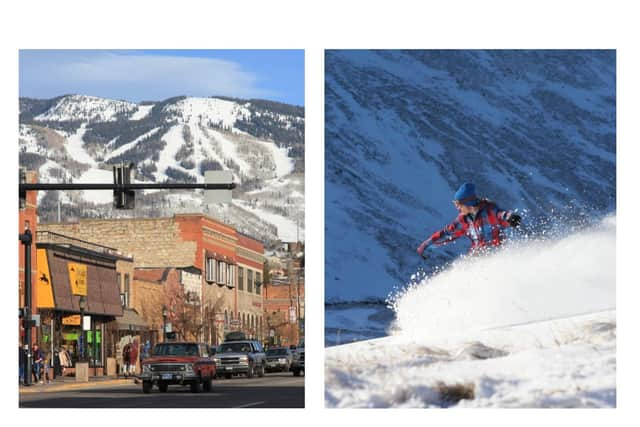Skiing: The best way to beat lift pass price hikes? Ski and board in Scotland
Like pretty much everything else in these inflationary times, the cost of skiing and snowboarding appears to be heading in a northerly direction this winter. According to a recent audit of lift pass prices conducted by ski travel site snowplaza.com, the average price of a six-day lift pass in the Alps is up by 8.42 per cent compared to this time last year. Fancy six days skiing in Switzerland? That'll set you back £354 on average. Maybe Austria then? Make that £316. Even in France and Italy, where things generally tend to be a little less eye-watering, you're still looking at an average of £291 and £276 respectively. And to be clear: this is just the price of lift passes we're talking about. Unless you're reading this from your very own fully-catered, ski-in ski-out Alpine abode, you'll also need to factor in flights, transfers, accommodation, food, drink, ski hire... the list goes on.
Compared to some of the prices currently being charged in North America, however, European ski passes look like a bargain. For a single day's skiing at Winter Park, Colorado, an adult pass during peak season could set you back as much as $249 this year – that's £197 at current exchange rates. And believe it or not, for Colorado that's actually pretty reasonable. Like the idea of spending a day blasting through champagne powder at Steamboat alongside folks whoopin' and hollerin' in unironic cowboy hats? That'll be $269 (£213) please, pard'ner. Upmarket Vail or Beaver Creek? They're both charging up to $275 this year – equivalent to £218 per day. Ooft.
Advertisement
Hide AdAdvertisement
Hide AdTo be fair, things are a bit cheaper if you buy multi-day passes online. I just tried to book a six-day pass for Beaver Creek starting on Saturday 10 February, and was quoted $1,290, equivalent to £1,021. Still, having snowboarded in various different resorts in Colorado, I can confirm that, while it's a wonderful place to visit, it is definitely not three-and-a-half times better than Italy.


I know what you're thinking: if only there was somewhere in the world where it was possible to ski or snowboard for less; a place where prices are roughly the same as they were before the pandemic; a place where you won't have to deal with jet lag at either end of your trip; maybe even a place where there's no language barrier, so you don't have to worry about accidentally ordering some kind of sinister-looking dumpling at lunchtime when all you really wanted was sausage and chips. Well, I have good news for you reader: such a magical kingdom does indeed exist, and its name is Scotland.
Here, happily, it's still possible to go skiing without having to think about selling a kidney when you get back. At the start of the ill-fated 2020/21 season, for example, the folks at Glencoe set their ski pass prices at £27 for a weekday and £35 for Saturdays and Sundays. Have those prices increased for the 2023/4 season, following the recent period of rampant inflation? Well, yes, but not by much – it's now £30 for a midweek day pass and £37 for a weekend day pass. In percentage terms, that's an average annual increase of just 3.7 per cent for a midweek ski and 1.9 per cent for weekends. What else has only increased in price by 1.9 per cent a year over the last three years?
It's a similar story at most of the other Scottish resorts – a day pass at the Lecht is £38 this season, at Glenshee it's £35 and at Cairngorm it's just £30 (although at time of writing it's not clear if or when the funicular will run this winter, so the lower price reflects that). The only outlier is Nevis Range, where a day pass will set you back £45.95.
True, with the exception of Nevis Range the Scottish resorts don't offer discounted multi-day passes like their Alpine equivalents, but at most of them you can get a full season pass for not far off the price of six days skiing in Switzerland. An adult season pass at Cairngorm costs £358, while Glencoe, Glenshee, Nevis Range and the Lecht charge £380, £425, £420 and £400 respectively. At those prices, once you've got ten or 11 days' skiing under your belt you’re effectively getting to ski for free for the rest of the season.
In two decades of writing about snowsports for this newspaper, I honestly can't remember a time when the difference between the cost of skiing here and the cost of skiing overseas has been so pronounced. True, weather and snow conditions are more variable in Scotland than they are in the Alps and the Rockies, and the total number of skiable days will always be significantly less. Then again, with far more people working from home and with greater flexibility than before the pandemic, the potential number of skiers able to capitalise when the conditions suddenly come good has increased markedly. Who knows what the winter of 2023/24 will bring, but even if it's only an average year, a reasonably motivated Scottish skier with a season pass should be able to bag themselves 20 days skiing here for the price of just a couple of days in Colorado. And, of course, by skiing at home they’ll also be keeping a lid on their carbon emissions. There’s never been a better time to stay put.
